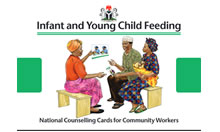Lessons Learned from Implementing UNICEF’s Community Infant and Young Child Feeding (C-IYCF) Counseling Package
Optimal infant and young child feeding (IYCF) practices, including breastfeeding and complementary feeding, are crucial for child survival and physical and cognitive development. However, less than 40 percent of the world’s children under 6 months of age are exclusively breastfed, and the proportion of children aged 6-23 months who receive the minimum acceptable diet is generally low. Various social and behavior change (SBC) approaches are used globally to improve IYCF, however, many programs focus on disseminating messaging and basic “promotion,” without developing community activists’ and frontline health workers’ core counseling and problem-solving skills.
In 2010, UNICEF developed and tested the Community Infant and Young Child Feeding (C-IYCF) Counseling Package through a strategic partnership with Nutrition Policy Practice and the Center for Human Services, the not-for-profit affiliate of University Research Co., LLC (URC/CHS).This evidence-based package provides a generic set of training and counseling tools specifically designed for community agents. It was designed for easy adaptation to local contexts, acknowledging both the importance of community-based support for IYCF and the need for high quality materials targeting this cadre. By the end of 2014, over 40 countries had adopted all or most of the C-IYCF counselling package and adapted it to their own diverse settings.
SPRING and UNICEF presented this webinar, in which participants learned about the experience of scaling up the UNICEF C-IYCF counseling package and lessons learned from an evaluation of community infant and young child feeding (C-IYCF) counselling package in Nigeria.
Evaluation of the C-IYCF Counseling Package in Nigeria (PDF, 489 KB)
Scaling Up Community-Based IYCF in Indonesia: Impact with Equity (PDF, 474 KB)
Development and Roll Out of a Community IYCF Counselling Package (PDF, 692 KB)
Q&A Responses (PDF, 324 KB)
